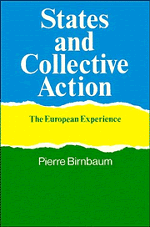Book contents
- Frontmatter
- Contents
- Acknowledgements
- Introduction
- 1 Mobilisation theory and the state: the missing element
- 2 States, free riders and collective movements
- 3 The state and mobilisation for war: the case of the French Revolution
- 4 Ideology, collective action and the state: Germany, England, France
- 5 Individual action, collective action and workers' strategy: the United States, Great Britain and France
- 6 The state versus corporatism: France and England
- 7 The Nazi collective movement against the Prussian state
- 8 Territorial and ethnic mobilisation in Scotland, Brittany and Catalonia
- 9 Nation, state and culture: the example of Zionism
- 10 The state, the police and the West Indians: collective movements in Great Britain
- Conclusion: the end of the state? From differentiation to dedifferentiation
- Notes
- Index
Conclusion: the end of the state? From differentiation to dedifferentiation
Published online by Cambridge University Press: 04 August 2010
- Frontmatter
- Contents
- Acknowledgements
- Introduction
- 1 Mobilisation theory and the state: the missing element
- 2 States, free riders and collective movements
- 3 The state and mobilisation for war: the case of the French Revolution
- 4 Ideology, collective action and the state: Germany, England, France
- 5 Individual action, collective action and workers' strategy: the United States, Great Britain and France
- 6 The state versus corporatism: France and England
- 7 The Nazi collective movement against the Prussian state
- 8 Territorial and ethnic mobilisation in Scotland, Brittany and Catalonia
- 9 Nation, state and culture: the example of Zionism
- 10 The state, the police and the West Indians: collective movements in Great Britain
- Conclusion: the end of the state? From differentiation to dedifferentiation
- Notes
- Index
Summary
In the 1950s, when industrialisation seemed to be triumphing and the welfare state was spreading, numerous theorists were prepared to announce that, in a world where rationalisation was extending ever further, the end of ideologies was at hand. Political sociology also ceased to be concerned with the concept of power and the idea of conflict. In a period in which politics was declared to be at an end, it remained a fortiori anachronistic to enquire into the role of the state. Apolitical, developmentalist perspectives, which saw modernisation in evolutionist terms, with the state being nothing more than a function within a system, were only abandoned much later, when a return to the political – to its history, to its diversity within a range of different cultural spaces, to its structuring in terms of types of specific power – was effected. This accounts for the return, in our own period, to the question of the state, which may be regarded as just one of the many forms of constituted political power. If one rejects both the purely philosophical and the purely institutional conceptions of the state, if one also refuses to regard it as simply a subject of international law endowed with attributes of legitimacy, and if, finally, one wishes deliberately to adopt an ideal-typical approach, one can choose, in one's attempts to account for the extreme diversity of existing institutions, to regard as a state every differentiated political power which is differentiated from social, territorial or partisan peripheries, and which is set going by actors associated with functions whose efficacy increases the more this power, with all its claims to universality, is realised.
- Type
- Chapter
- Information
- States and Collective ActionThe European Experience, pp. 182 - 195Publisher: Cambridge University PressPrint publication year: 1988



